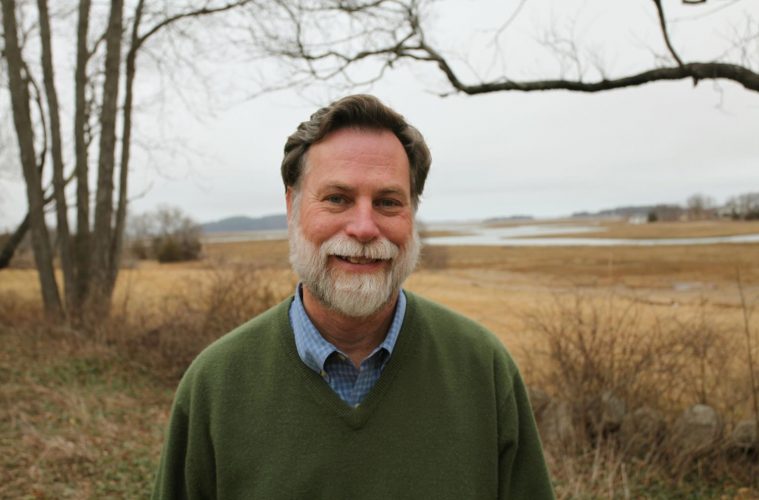Ahead of Ed Becker’s retirement, his colleagues at Essex County Greenbelt produced an eight-minute video full of genuine praise—and fake beards. The finale features 11 of Becker’s co-workers, male and female alike, donning prop facial hair and shouting “Happy trails, Ed!” as part of a tongue-in-cheek tribute to the outgoing executive director of the Essex-based land trust. “I’ve been at this for a while, and with my prominent, now-white beard, I can’t hide,” the 64-year-old Becker says with a chuckle.
In the last 31 years, Becker has done far more than add silver to his bristles: He’s helped Greenbelt ensure that more of the North Shore’s landscapes remain unspoiled and available for public enjoyment. Since Becker joined the organization in 1987, the amount of farmland, scenic lands, wildlife habitats, and other open space that Greenbelt conserves has more than quadrupled. Over the same span of time, the organization itself grew from a three-person skeleton crew to a best-in-class, 14-employee land trust. And while Becker, who passes the mantle on September 30, is too unassuming to take the credit, the Rockport resident is pleased with the strides made on his watch.
“The average number of projects we were able to acquire each year, the acres we’re saving—all of that has increased continuously in the last dozen or so years, and our strategic plan certainly wants to continue that trend and expand even further,” he says.
Becker’s love of nature started casually enough when he was a child in Connecticut. “I’m old enough to have grown up in an era where Mom would send you out in the morning, you were outside all day, and the expectation was that you’d make your own fun and be back for dinner,” he says. A lifelong love of hiking, camping, and general wandering led to his matriculation in Yale University’s forestry school, and the advent of the environmental movement in the 1970s brough him to Boston to carve out a career. At a consulting firm, he helped create some of the first energy performance standards for buildings.
In his first visits to the North Shore, Becker was in awe of the region’s physical character: barrier beaches, rocky coastline, the woodlands, and rolling terrain. “What struck me was being that close to Boston and seeing a landscape that was still so beautiful and largely intact,” he says. After five years working at an environmental nonprofit in Boston, he heard from a friend that Greenbelt, a land trust that had started in 1961 and operated out of an 18th-century farmhouse on the Allyn Cox Reservation in Essex, was hiring an executive director. It was an exciting time for the land conservation movement in the Commonwealth; a late 1980s building boom ended in a building bust, with proposed developments suddenly available for acquisition as open space. Meanwhile, mechanisms like conservation easements, which enable land to stay in private ownership while remaining permanently protected, came to the fore.
“There was a growing interest, not in preventing development, but rather [in] working to preserve those special places that should be set aside,” Becker says. “In working with the 34 towns and cities of Essex County and a litany of conservation partners, Greenbelt increased its holdings from 4,000 acres in 1987 to 17,500 acres today, leaving a lasting legacy on the North Shore’s landscape.” One major initiative occurred in the late 1990s, when Greenbelt partnered with the Massachusetts Department of Transportation to acquire conservation easements along both sides of Route 128 from Beverly to Gloucester.
More recently, the John J. Donovan Reservation and Sagamore Hill Conservation Area, consisting of 525 acres overlapping Hamilton, Essex, and Ipswich, represents a complicated Greenbelt acquisition that quickly became a public favorite.
At the end of September, Kate Bowditch, a nearly 25-year veteran of the Charles River Watershed Association, will take over. But don’t expect Becker to slow down when he’s off the clock; he’s looking forward to days of walking in the woods, sea kayaking, and volunteering. And for all that’s changed since Becker turned a love of the outdoors into a career, the simple joy of unplugging and spending time in the natural world strikes him as deeply as ever.

